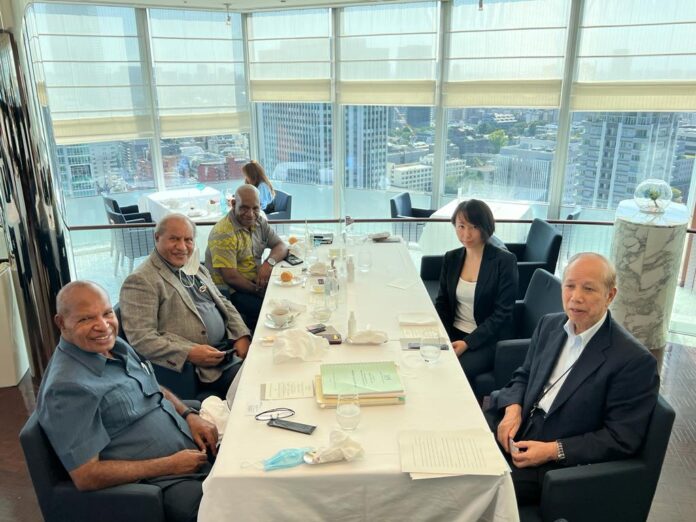September 26, 2022
Japan Ready to Help Papua New Guinea
The CEO and Chairman of Japan Development Institute (JDI), Dr. Shoichi Kobayashi met with the Minister for International Trade and Investment, Hon. Richard Maru yesterday in Tokyo to express JDI’s keen interest to come to Papua New Guinea (PNG) and help develop a new Special Economic Zone Master Plan for the country and work with partners like the Asian Development Bank (ADB), JICA and the World Bank to build SEZs right across the country.
JDI is an independent private think tank firm based in Tokyo. JDI has been engaged by many Governments in Asia and Africa over the last 40 years to develop SEZs including China, the Philippines, Bangladesh, Tanzania and many others, and have learnt from the successes and failures of SEZ developments and are ready to assist PNG. China is the most successful country in the world, where they now have 2500 SEZs in operation, creating millions of jobs and contributing towards the transformation of China into becoming the leading economy in the world today.
The Marape-Rosso Government has recently passed the Special Economic Zone Authority Act and established the Special Economic Zone Authority to be the regulator and overseer of the establishments of SEZs in PNG. SEZs are economic drivers which are called different names depending on the type of economic activities being undertaken in the locations including Special Economic Zones, Industrial Parks, Eco-Industrial Parks, Technology Parks and Innovation Districts. The Marape-Rosso Government has identified 12 potential SEZs and they are Pacific Marine Industrial Zone (Madang), Vanimo Free Trade Zone (Sandaun) Sepik Plains SEZ (East Sepik and Sandaun), Western Province SEZ, Baiyer Agriculture Zone (Western Highlands), Middle Ramu Industrial Zone (Madang), Central Province Rice Zone, Labu SEZ (Morobe), Lae- Nadzab SEZ (Morobe), Ihu SEZ (Gulf), Kokopo Tourism Zone (East New Britain) and Manus Special Economic Region.
“These potential SEZs identified by the Government need to be evaluated to assess the cost and benefits of developing these zones including all the enabling infrastructure. We now need to engage global experts to work alongside local consultants to complete Feasibility Studies on each of the potential zones. The results from the studies will best inform our Government on how best to progress with the development of each of these potential SEZs. Without such studies, it will be impossible to package these potential projects to seek funding for the development of these proposed zones,” said Minister Maru.
Minister Maru thanked PNG Ambassador to Japan, His Excellency Samuel Abal for arranging the important meeting with JDI. He is also very thankful for JDI’s interest to help PNG Government to develop a new SEZ Master Plan for the country.
JDI’s approach to SEZ development is called the ‘A-Z Approach’ which is to truly understand and assess the background and the nature of the problem since they believe that without proper ascertainment, any proposal or suggestions would be ineffective and ambiguous as a real solution. JDI is a result-oriented firm that provides constructive and realistic solutions or proposals that really work. Their projects extend to capacity development projects at Government policy and legal system level, Formulation of Government framework, Feasibility Studies (Demand Study, Marketing Research and Financial Analysis), Procurement of goods and services, Master Planning, and Investment Promotion.
JDI has been specialized in assisting Governments of various countries over the last 40 years to create SEZs to propel inclusive economic growth and job creation on a scale never seen before. They are currently engaged by the Bangladesh Government to assist the country to create 100 Special Economic Zones and create one million new jobs there.
“Dr. Kobayashi expressed JDI’s interest to come to PNG to help us develop a new SEZ Master Plan for PNG and to implement that plan to create thousands of new jobs, stimulate economic growth and we are extremely thankful for the offer,” said Minister Maru.
“We will be discussing this with the Prime Minister when he arrives (in Tokyo tonight). If he agrees then he will officially invite JDI to come over to PNG to help us formulate a Master Plan, meaning which locations should have a SEZ and help us implement the development of these SEZs right across the country, starting with the PMIZ in Madang,” said Minister Maru.
“We are looking forward to JDI coming to assist PNG to help us use their global network, expertise and experience gained over 40 years to help us develop a Master Plan for the development of SEZs and build those zones in order for us to create thousands of new jobs for our citizens and produce a lot of goods for export and to replace a lot of the imports that we currently import, resulting in a huge leap in sustained and inclusive economic growth,” he said.
“After briefings with the PM, I am sure we will be inviting JDI to come to PNG for an initial visit towards the end of October this year. They will visit all the potential SEZs, do their studies with our local experts and international experts and put together the Master Plan and help us mobilize resources to build the SEZs,” Minister Maru added.
“My Ministry stands ready to lean on the expertise of JDI to help us chart a Master Plan and implement SEZ development right across Papua New Guinea, starting with the PMIZ in Madang,” he said.
Minister Maru said that JDI’s offer was an exciting opportunity for the country.
“If we go down the same part based on global experience, PNG can create thousands and thousands of jobs, especially for our young people, using the SEZ development as the key drive for economic growth and employment creation,” he said.
Dr. Kobayashi said that SEZ was not something that was decided because of politics but only established if there was a demand, a need and an economic basis to develop one.
“In the case of PMIZ in Madang, our country currently processes only 30% of the tuna catch in the country; the other 70% is exported out of our country. Currently, National Fisheries Authority (NFA) only receives licensed fish from the incenses that it issues to fishing companies who fish our waters. The revenue that we make from that is estimated at K500 million a year. If we build the PMIZ and we are able to process all the fish in the country (at the proposed PMIZ in Madang), not only our fish caught in PNG waters but even fish from our neighboring Pacific Island countries. PMIZ will create 40, 000 new jobs,” said Minster Maru.
“What we want to do is provide the processing capacity in PNG so we can process all the fish that is caught in PNG waters; in other words, we don’t give licenses to any fishing company that will not process in PNG. So, in the case of the PMIZ, the economic justification is there,” he said.
Minister Maru said the PMIZ project in Madang would cost around a billion kina to build a wharf, put in a power plant, a water supply plant, a sewerage system, fuel storage facilities, office spaces and the township and residential development to cater for over 10 canneries to be located in the PMIZ.
“We also have the Madang Airport which is being upgraded right now. Once it is extended, the bigger planes can land in Madang and we can have tuna from PNG be directly exported to Japan,” he said.
Minister Maru also thanked the Marape-Rosso Government for recently passing the Special Economic Zone Authority Act.
“This Act has now created the regulatory body called the Special Economic Zone Authority that will now oversee the developments of SEZs. The Authority will report to me under my new Ministry,” he said.


